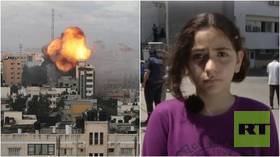Karin Kneissl: Solutions to the Palestinian-Israeli conflict have been known for decades
No other such topic has borne so many institutes, experts and conferences as the Israel-Palestine conflict. One land, two peoples, three religions, and many interests.
The current eruption of violence between Israel and Palestine did not fall out of the sky and it will not lead to biblical armageddon, like some radicals expect. A dangerous status quo will be preserved until next time.
As the Ottoman Empire fell apart at the end of the First World War, the ‘Eastern Question’, as the issue was called by diplomats from St. Petersburg to Paris, was settled according to military standings of 1918. Between them, the British and French split the former Ottoman provinces into new sovereign states, which were initially ruled by colonial mandate. The secret Sykes-Picot Agreement negotiated in 1915 and struck in the early days of 1916 still provided for international administration of the religious sites around Jerusalem. However, from 1923, the British were to assume complete control of Palestine west of the Jordan River. To the east of this a small kingdom called the Emirate of Transjordan was created for the once-powerful Hashemites.
Young national movements
Jewish nationalism was, just like Arabic national movements, a latecomer. Around 1900, between Vienna and Paris, Theodor Herzl wrote the founding papers of political Zionism while watching the anti-Semitic legal scandal involving Officer Alfred Dreyfus unfold. Initially, he wanted a secular Jewish state, a kind of utopia. Madagascar and Uganda were both touted as future national territories. However, at one of the first Zionist congresses in Basel, “Hovevei Zion,” literally “Lovers of Zion” prevailed. This made clear that a Jewish state should be re-established where it had been ended by the Romans 2000 years before: Palestine. Although it was not a land without a people for the people without a land.
The domiciled population, both Arabs and Jews, as well as Turks, Bedouins or Levantine merchants, did not see themselves as Palestinians at that point. Rather they regarded themselves as Syrians, according to the survey by the King-Crane Commission. A Palestinian national consciousness gradually arose with the post-war displacement and the 1948 founding of Israel. The Palestinian right of return is, much like the Jerusalem question, a hot-button issue.
The UN General Assembly's 1947 Partition Plan was not implemented. Rather, the acquisition of territory was about “faits accomplis" on the battlefield from the very beginning. When I was allowed to use the archives of the President's Office in Jerusalem for my 1988 dissertation on the concept of borders, I stumbled upon the telegram sent by the first premier, David Ben-Gurion, to his UN ambassador, Abba Eban. The basic gist of the correspondence was this: Borders will not be negotiated, everything will be decided militarily.
Borderless
When UN Resolutions refer to “Israel in the pre-1967 borders,” it is wrong on multiple levels. This is because Israel has still not defined its national territory with reference to the state of war. The Six-Day War in June 1967 ended with a ceasefire, not a long-lasting armistice as in 1949. Since then, the lines have blurred as a result of settlement construction and security zones.
There are frontiers but not borders, which are in constant movement between the so-called Palestinian and Israeli settlement areas. For decades, the areas have been moving constantly in the name of the Palestine conflict. And not just there. The Israeli occupation of Southern Lebanon from 1978 to 2000 also shows an effort to extend territory through a mix of agricultural and military means.
The erection of Israeli settlements is a constant in the long list of violence, the origins of which can be traced back to the serious clashes in Hebron in 1929. The British Administration tried to stop immigration in the face of the Jews fleeing National Socialism. This was due to rising levels of violence with the resident Arab population. In 1937, London commissioned a fact-finding mission under Lord Peel. The resulting report said all there needed to be said about the drama in the Middle East: Firstly, all settlement construction must be stopped. Secondly, all hostility must be halted.
All UN resolutions since then have repeated these demands, although the texts became longer and more ambivalent. 1967's Security Council Resolution 242 just after the Six-Day War was still legible. On one page, everything required to find a solution was to be found in a few paragraphs. Five veto powers worked on this text together, which stands out from those of our time due to its clear language and readability. In 1979, the Israeli army withdrew from Sinai following a peace treaty with Egypt. In 2005, and without agreeing with the Palestinian side, the withdrawal of thousands of settlers from Gaza took place under Ariel Sharon. Of course, the Israeli army has since carried out regular offensives in Gaza. The 1993 Oslo Accords brought two years of high expectations. Although, these were brought back down to ground by the murder of Israeli PM Yitzhak Rabin. The problem with the Oslo negotiations was that the mediators were too focused on negotiation dynamics, rather than the larger sticking points, such as leaving Jerusalem's status open.
Further annexations in breach of international law, like those of Golan and East Jerusalem taking place since the 1980s, have been on Prime Minister Benjamin Netanyahu's agenda since 2018. Some say that the ‘Abraham Accords’ with some Arab Gulf states preempted this. The Palestinian question did not feature centrally in any of these documents, which look more like trade agreements. In any case, the Palestine question was pushed into the slipstreams of regional conflicts at the outbreak of the Arab Spring revolts in 2011 at the latest, and the wars in Syria and Libya. Who still spoke about the Palestinians? Their power to mobilise seemed to be gone.
However, now there are considerable protests taking place from London to Berlin and across the Islamic world. The events in Jerusalem have left nobody without an opinion. However, some demonstrations chant both old and new anti-Semitic rallying cries. Emotions on the streets are high, whether in Europe or the Middle East. Mob justice and blind hate on both sides go hand-in-hand with this old territorial conflict.
At the same time, old fault lines between Israeli Arabs and Jewish Israelis are cracking. That is nothing new, what is new is the intensity of the violence. The already fragmented Israeli society is not immune to Balkanisation akin to the Yugoslav Wars. Militias are spreading in place of the army.
Everything in limbo
The US is sustaining its UN Security Council veto against a ceasefire. In the summer of 2006, much to the suffering of the Lebanese civilian population, Israel and Hezbollah were allowed to drag out exchanges of fire for days. Although this violent episode may too fizzle out in the coming days, it will likely make way for another one in the foreseeable future. After days of military violence one thing is clear: the Palestinian question is back. Regional powers, particularly those whom Netanyahu won as partners, are in a dilemma. The UN is paralysed. The US does not want to be bothered by this. Russia offered communication channels but the already pouting Europeans would not bite. China is an important partner to Israel and Beijing might play a geopolitical role in the next round.
There truly is nothing to be said of this conflict that hasn't been said before. British parliamentarian Lord Peel's 1937 report made the most cogent requirements clear. Namely, no more settlement building and no more conflict. In 2021, there is general perplexity. War crimes are rampant. A start would be when fundamental rules of engagement are adhered to.
The statements, views and opinions expressed in this column are solely those of the author and do not necessarily represent those of RT.














